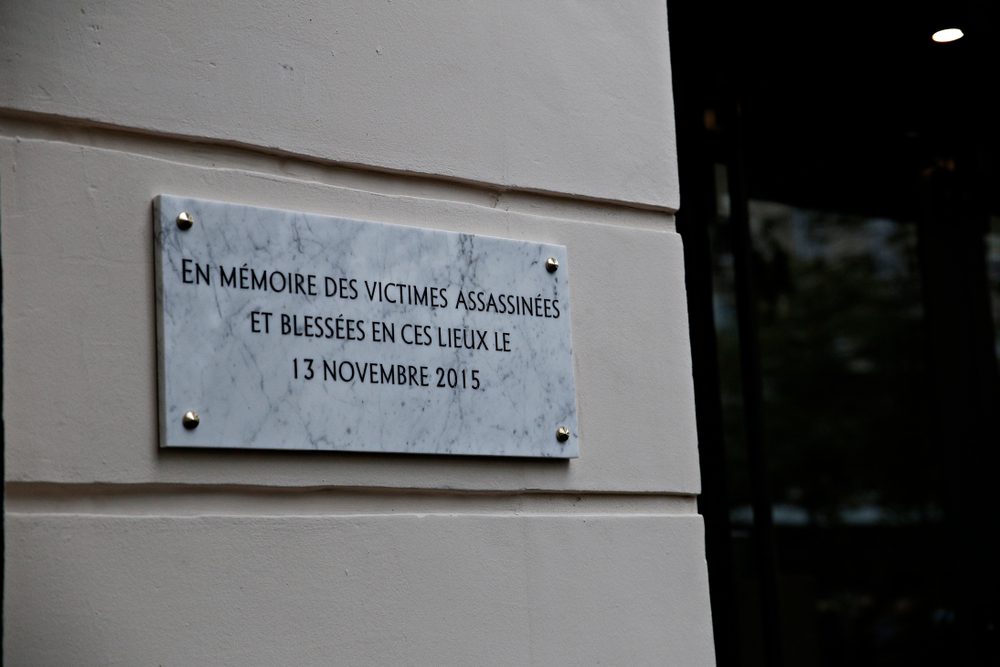
The historic trial for the perpetrators of the 2015 Paris terrorist attacks has now concluded.
Fourteen out of twenty defendants were present to stand trial for the attacks that killed 130 people in Paris and Saint-Denis on 13 November 2015, known as the ‘Bataclan attacks’ or ‘Paris attacks:’ fourteen out of twenty defendants in all, as one is detained in Turkey, and five are presumed dead in Syria.
The Paris terrorist attacks refer to a series of shootings and suicide assaults, claimed by the Islamic State and perpetrated in Paris and the suburbs by three separate commandos.
A first suicide bomb detonated in Saint-Denis, near the Stade de France, north of Paris. This was followed by shootings on café terraces in the 10th and 11th arrondissements of Paris—reminiscent of the modus operandi used by the National Liberation Front (FLN) during the Algerian war. The deadliest attack, killing 90 people, took place in the Bataclan theatre during a rock concert. The members of the commando group fired on the audience, before French police ended the massacre by killing the terrorists.
The attacks were the deadliest ever in France, and the second deadliest in Europe after the Madrid bombings in 2004. The gravity of the situation prompted the government to declare a state of emergency throughout the country, something that had not happened since the 1961 Algiers putsch.
After months of an extraordinary trial, Salah Abdeslam, the only surviving member of the commandos behind the massacre and recognised as the “mastermind” of the operations, was sentenced to life imprisonment: a rare sentence, created in 1994 in French law, which prevents the convicted person from requesting an adjustment of the sentence before thirty years of detention. Until now, this sentence had only been pronounced four times, each time for the rape, torture, and murder of children, for which it was initially created. Salah Abdeslam was also the only defendant who appeared in court to receive this sentence. Sentences, ranging from four years to life imprisonment, were handed down to the other defendants.
The court followed the recommendations of the National Anti-Terrorist Prosecutor’s Office in assigning the sentences. All the defendants were found guilty of what they were accused of; only the man who provided false identity papers to four members of the commandos had the terrorist qualification removed from his act. The civil parties are satisfied with the verdict. The newspaper Le Monde welcomes a “rigorous and nuanced” verdict, while the left-wing newspaper Libération contests the life sentence which removes the “right to hope” for the convicted.
The trial, which opened in September 2021, lasted ten months. It has been described as the trial of the century, out of the ordinary in many respects because of its length and the resources deployed: 2,400 civil parties; an investigation file of 542 volumes (i.e., one million pages); 10 television broadcasting rooms; 330 lawyers present at the trial.
The trial opened with a striking statement by the main defendant in the dock: ‘mastermind’ Salah Abdeslam. “First of all, I would like to say that there is no God but Allah and Mohamed is his servant.” By explicitly declaring the religious dimension of his act, he embarrassed the judges and the media who, despite the horror of the attacks, still struggle to accept the notion of Islamist terrorism. When the president of the court of assizes asked him about his profession, Salah Abdeslam answered very clearly: “I left my profession to become a fighter for the Islamic State.”
However, there was a certain—relative—evolution during the long months of the trial.
Two days before the verdict, he reserved his very last words for the victims: “I have apologised to you, some will tell you that it is insincere, that it is a strategy. More than 130 dead, 400 injured … Who can apologise insincerely after so much suffering?”
However, he tried to defend himself one last time: “I recognised that I was not perfect, I made mistakes, it is true, but I am not a murderer, I am not a killer. And if you convict me of murder, you will be committing an injustice,” he said. For him, the killers “are not in the box,” and for good reason, since they all died on the evening of the attacks—voluntarily, or at the hands of the police.
The defendants now have ten days to appeal.
